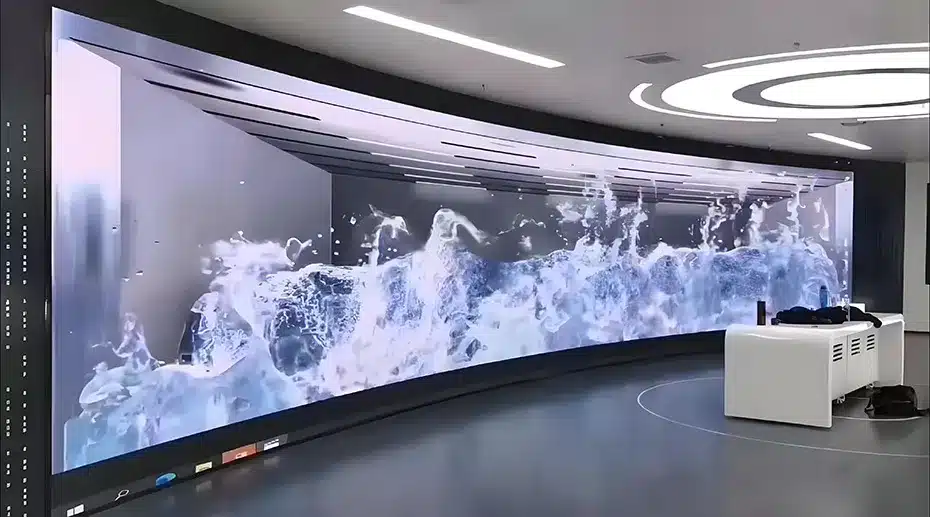
SMD vs. MIP: Which LED Display Packaging Technology is the Future? 💡
Behind every vibrant LED display, two major packaging technologies are silently competing—SMD (Surface-Mounted Device) and MIP (Micro LED in Package). These technologies define the performance, durability, and efficiency of LED displays.
So, how do they differ? And which one should you choose for your display project? Let’s dive in! 🚀
🔍 1. What is SMD Packaging Technology?
📌 What is SMD?
SMD (Surface Mounted Device) packaging mounts LED chips directly onto a PCB (Printed Circuit Board). Each LED bead contains an LED chip, bracket, and wire bonding, creating a compact and efficient light-emitting unit.
✅ Advantages of SMD
✔ Mature & Cost-Effective – The widely adopted SMD technology makes production affordable and scalable.
✔ Easy Maintenance – If one LED bead fails, it can be easily replaced without affecting others.
✔ Good Heat Dissipation – The direct contact with the PCB allows for efficient heat dispersion.
❌ Disadvantages of SMD
✖ Lower Protection Level – Exposed LED beads are prone to dust, moisture, and static electricity damage.
✖ Limited Ultra-HD Capability – Pixel spacing restricts super-high-definition (SHD) displays.
💡 Where is SMD Used?
SMD technology is widely used in:
✔ Indoor & Outdoor LED Displays – Security monitoring, command centers, exhibitions, advertising, and smart conferencing.
✔ Cost-Sensitive Projects – Ideal for applications with a tight budget but requiring good display quality.
🔬 2. What is MIP Packaging Technology?
📌 What is MIP?
MIP (Micro LED in Package) is a new-generation technology based on Micro LED packaging. It involves:
✔ Chip-Level Packaging – Instead of mounting LED chips directly onto the PCB, MIP packages Micro LED chips first before integrating them into the display.
✔ High-Density LED Arrangement – Enables ultra-fine pixel pitch for stunning display quality.
✅ Advantages of MIP
✔ Superior Display Quality – Achieves higher brightness, contrast, and color uniformity.
✔ Low Maintenance – Individual LED units are easier to replace, reducing maintenance costs.
✔ Excellent Protection – Superior resistance to moisture, dust, and static electricity.
❌ Disadvantages of MIP
✖ Higher Cost – Advanced manufacturing & micro-LED placement techniques increase production costs.
✖ Limited Market Adoption – MIP is still in early development and less commonly used than SMD.
💡 Where is MIP Used?
MIP technology is ideal for high-end applications, such as:
✔ Luxury Retail & Advertising – Cinematic displays, high-end digital signage, and immersive advertisements.
✔ Virtual Production & Film Studios – MIP enhances realism in virtual environments.
✔ Next-Gen Displays – As costs decrease, MIP will enter the consumer market.
⚖ 3. Key Differences: SMD vs. MIP
| Feature | SMD (Surface-Mounted Device) | MIP (Micro LED in Package) |
|---|---|---|
| Technology | Directly mounts LED chips onto PCB | Packages Micro LED chips before integration |
| Display Quality | Good but limited ultra-HD | Excellent, with higher brightness and contrast |
| Protection | Lower, prone to dust & moisture | Superior, highly durable |
| Maintenance | Easy, single LEDs can be replaced | Low maintenance, easier LED replacements |
| Cost | Lower, budget-friendly | Higher, due to complex manufacturing |
| Common Uses | Advertising, smart displays, command centers | Luxury retail, film production, premium advertising |
🔎 4. Choosing Between SMD & MIP
💡 Which technology should you choose?
✔ For budget-conscious projects → SMD is a cost-effective and mature choice.
✔ For premium, high-definition displays → MIP offers unbeatable image quality.
🌟 The Future of LED Displays
🔹 SMD will continue to dominate mid-range & outdoor displays due to its affordability.
🔹 MIP is the future of ultra-HD, fine-pitch displays, eventually entering mainstream markets as costs drop.
📢 Are you investing in LED displays? Which technology suits your needs best? Comment below! 🚀